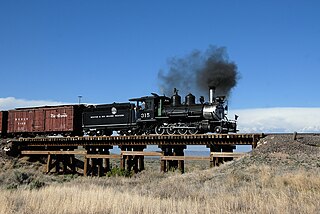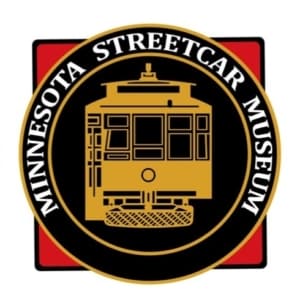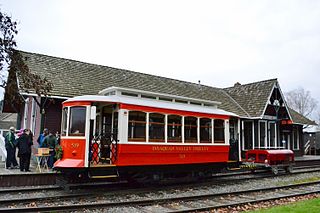
A heritage railway or heritage railroad is a railway operated as living history to re-create or preserve railway scenes of the past. Heritage railways are often old railway lines preserved in a state depicting a period in the history of rail transport.

Conservation and restoration of rail vehicles aims to preserve historic rail vehicles.

A Birney or Birney Safety Car is a type of streetcar that was manufactured in the United States in the 1910s and 1920s. The design was small and light and was intended to be an economical means of providing frequent service at a lower infrastructure and labor cost than conventional streetcars. Production of Birney cars lasted from 1915 until 1930, and more than 6,000 of the original, single-truck version were built. Several different manufacturers built Birney cars. The design was "the first mass-produced standard streetcar " in North America.

The TECO Line Streetcar is a heritage streetcar transit line in Tampa, Florida, run by the Hillsborough Area Regional Transportation Authority (HART), owned by the city of Tampa, and managed by Tampa Historic Streetcar, Inc. It connects Downtown and Channelside to the historic Ybor City district. There is also an "In-Town" trolley-replica bus system that connects Downtown, Channelside, and Harbour Island.

Old Pueblo Trolley is a non-profit, educational corporation based in Tucson, in the U.S. state of Arizona, that is dedicated to the preservation of Arizona's mass transit history. The name also commonly refers to the heritage streetcar line which OPT began operating in 1993, on which service is currently indefinitely suspended. OPT consists of three divisions that each fill a specific role in preserving the state's mass transit history. The divisions are the Street Railway Division, Motor Bus Division and the Museum Division.

The McKinney Avenue Transit Authority (MATA), a non-profit organization, operates the M-line Trolley in Dallas, Texas (USA). The offices and car barn are located at 3153 Oak Grove, Dallas, TX 75204. In operation since 1989, it is an example of a heritage streetcar running historic cars. The main stretch of the line runs down McKinney Avenue in Uptown. While the "M-Line" name was officially adopted for the service in 2002, the line continues to be commonly known as "the McKinney Avenue trolley".

Streetcars were part of the public transit service in Kenosha, Wisconsin in the first third of the 20th century, and returned to this role in 2000.

The Minnesota Streetcar Museum (MSM) is a transport museum that operates two heritage streetcar lines in Minneapolis, Minnesota and the western suburb of Excelsior.

The American Car Company was a streetcar manufacturing company based in St. Louis, Missouri, United States. It was one of the country's leading streetcar builders during the heyday of streetcar operation. The company was founded in 1891 by William Sutton and Emil Alexander, who had previously founded the Laclede Car Company in 1883 also in St. Louis, and had both got their start working in the streetcar business at St. Louis' horsecar manufacturer, the Brownell Car Company.

The Fort Smith Trolley Museum is a streetcar and railroad museum in Fort Smith, in the U.S. state of Arkansas, which includes an operating heritage streetcar line. The museum opened in 1985, and operation of its streetcar line began in 1991. Four vehicles in its collection, a streetcar and three steam locomotives, are listed on the National Register of Historic Places (NRHP). The now approximately three-quarters-mile-long (1.2 km) streetcar line also passes four NRHP-listed sites, including the Fort Smith National Historic Site, the Fort Smith National Cemetery, the West Garrison Avenue Historic District and the 1907 Atkinson-Williams Warehouse Building, which now houses the Fort Smith Museum of History.

The Issaquah Valley Trolley (IVT) was a heritage streetcar line in Issaquah, Washington, United States. It was a project of the Issaquah History Museums. The IVT operated from the Issaquah Depot Museum building located at 78 First Ave, NE. The service operated on a trial basis in 2001–02 and then on a regular basis, seasonally, from 2012 to 2020.

Streetcars or trolley(car)s were once the chief mode of public transit in hundreds of North American cities and towns. Most of the original urban streetcar systems were either dismantled in the mid-20th century or converted to other modes of operation, such as light rail. Today, only Toronto still operates a streetcar network essentially unchanged in layout and mode of operation.

The MATA Trolley is a heritage streetcar transit system operating in Memphis, Tennessee. It began operating on April 29, 1993. Service was suspended in June 2014, following fires on two cars. After nearly four years and repeated postponements, the reopening of the Main Street Line took place on April 30, 2018. In 2021, the system had a ridership of 237,900.
The Gomaco Trolley Company is a manufacturer of vintage-style streetcars, located in Ida Grove, Iowa, United States. The company has supplied replica-vintage streetcars to several transit systems in the US, and has also restored and rebuilt authentic vintage streetcars for some systems.
The Nelson Electric Tramway is a heritage railway at Nelson in the Kootenay region of southeastern British Columbia. It is one of two operational historic tram systems in the province.

Birney Safety Streetcar No. 224 is a streetcar in Fort Smith, Arkansas, listed on the U.S. National Register of Historic Places. Built in 1926 by the American Car Company, it is a type of streetcar known as a Birney "Safety Car". It was listed on the National Register in 1994 and is one of fewer than 10 streetcars listed.

The Astoria Riverfront Trolley is a 3-mile (4.8 km) heritage streetcar line that operates in Astoria, Oregon, United States, using former freight railroad tracks along or near the south bank of the Columbia River, with no overhead line. The service began operating in 1999, using a 1913-built streetcar from San Antonio, Texas. As of 2012, the service was reported as carrying 35,000 to 40,000 passengers per year and has been called a "symbol" and "icon" of Astoria. The line's operation is seasonal, normally during spring break and from May through September.

The Fort Collins Municipal Railway Car No. 22 is a streetcar listed on the U.S. National Register of Historic Places. Since 1995, the car has been located in Colorado Springs, Colorado.

Fort Collins Municipal Railway Birney Safety Streetcar No. 21 is a streetcar in Fort Collins, Colorado, listed on the U.S. National Register of Historic Places. Built in 1919 by the American Car Company for the Fort Collins Municipal Railway, it is a type of streetcar known as a Birney "Safety Car". It was listed on the National Register in 1984 and is one of fewer than 10 streetcars listed.


















